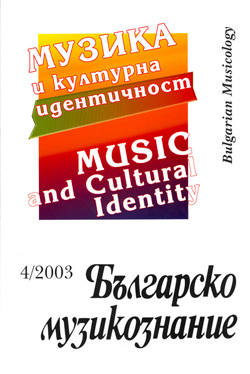„Привежда в благоритьм душата си..." (Псалмодиране в балканската славяноезична песенност през Средновековието)
"Acquiring a Blissful Rhythm in the Soul..." (The Psalmody in Slavic Balkan Church Chanting during the Middle Ages)
Author(s): Elena TonchevaSubject(s): Music
Published by: Институт за изследване на изкуствата, Българска академия на науките
Summary/Abstract: A hypothesis is formulated that during the penetration of Christianity among the Slavs on the Balkans (Bulgaria was officially converted to Christianity in the IX century) the church singing practice, based on an early type of strophic psalmody - “echos singing” type (l.Schkolnik), was adopted. Its composition system is based on a limited number of melody patterns and typified melodic motifs -formulae, subordinated to simple principles of organizing. This singing, practiced in Byzantium until about the middle of VII c., was not idiomelon, but it had means of individualizing the melody to a certain extent in accordance with the structural and meaningful characteristics of the text. At the same time it was easy enough to learn and reproduce orally. The hypothesis arguments are based on comparative study of Slav language Balkan singing: notated with Theta notation Sticheron Idiomelon for Good Friday “Tebe odeushchagosya” (5t1i echos) in Argirov Triodion of the XII c., Stichera Prosomoia for Virgin Mary’s holidays (1st echos), written down in Late Byzantine notation in the so called Zhegligovska anthology of the XV c. The chants are compared with parallel in text melodies, notated in the XVII-XVIII c. in Ukraine and Byelorussia with the Kiev square five-staff notation - these are melodies from a repertory permanently linked with the ethnonym “Bulgarian” - “Bolgarskij napel”, “Bolgarskil rospev”, “Bolgarskoe penie starodavnoe”. The discovered melody-composition similarities allow the suggestion that this repertory of “Bolgarskii rospev’’, which in the second half of the XVII c. migrated to Russia, is the described Balkan in origin Slav-language singing, which preserved its closeness to the early Christian psalmody. In the end, an idea is suggested that this type of psalmodic singing, preserved in the early Balkan church singing in Slav languages, is accomplished on the basis of free choice of the ethnos (Slav, Bulgarian?), on the basis of its specific mental tuning -as a particularly humble chanted prayer, a choice which can be taken as a marker of the Slav Balkan and respectively Bulgarian spiritual and cultural identity.
Journal: Българско музикознание
- Issue Year: 2003
- Issue No: 4
- Page Range: 22-43
- Page Count: 22
- Content File-PDF

